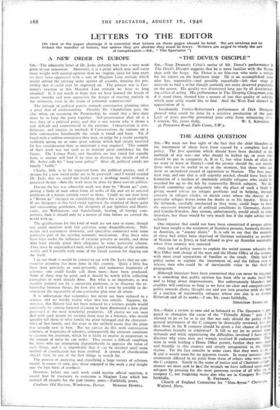LETTERS TO THE EDITOR
Iln view of the paper shortage it is essential that letters on these pages should be brief. We are anxious not to reduce the number of letters, but unless they are shorter they must be fewer. Writers are urged to study the art of compression.—Ed., The Spectator "J
A NEW ORDER IN EUROPE
Snt,—The admirable letter of Dr. Jacks certainly lays bare a very weak point in our armament. Moreover, it is a point which may well carry more weight with neutral opinion than we imagine, since for long years we have been oppressed with a sort of Maginot Line attitude which would defend the existing order against all assaults, denying the pos- sibility that it could ever be improved on. The present war is Ger- many's reaction to this Maginot Line attitude we have so long assumed. Is it too much to hope that we have learned the lesson of recent months and now appreciate the danger of trusting entirely to the defensive, even in the realm of economic construction?
The attitude of political parties towards constructive planning takes a good deal of understanding Possibly Mr. Chamberlain gave the clue when, on assuming the Premiership, he stated that a first duty
must be to keep the party together. Self-preservation after all is a first duty of a political party, and that is one reason why it shuns a
task difficult and controversial in the extreme. Conservatism is evo- lutionary, and empiric in method; if Conservatives do venture on a little constructive forethought the result is timid and hazy. Yet if faced with a sudden emergency they may, to judge by a recent example, suddenly spring on us some great scheme which had clearly received far less consideration than so important a step required. This sample
of their work was not such as to warrant great confidence for the future. The Labour Party and Socialists are less timid but equally hazy, as anyone will find if he tries to discover the details of what Mr. Attlee calls his " long term policy." After all, political creeds are largely " faiths."
Clearly, little is to be expected from the political parties, and if designs for a new social order are to be prepared—and I would remind Dr. Jacks that we could not build even a working model without a prepared design—thin the work must be done by those outside politics. During the last war admirable work was done by "Room 4o," com- prising a body of men taken from all walks of life and set to unravel problems of a nature entirely rovel to them. Could we not now have a " Room 40 " engaged on considering designs for a new social order? If our designers in this field could approach the standard of those quiet and unassuming gentlemen, the designers of our Spitfires and Hurri- canes, our Wellingtons and Sunderlands, beating all foreign com- petitors, then it should only be a matter of time before we carried the world with us.
The qualifications for this kind of work are not easy to name, though one could mention with fair certainty some disqualifications. Poli- ticians and economists obviously, and specialists connected with some particular part of the existing economic mechanism. Also those who have been under the influence of extreme poverty or wealth, and those who have already given their allegiance to some particular scheme. 'They must be unprejudiced men, with a good knowledge of the modern world, and if possible with some of the Greek passion for digging out the truth.
I do not think it would be correct to say with Dr. Jacks that no con- structive planning has been done in this country. Quite a little has been done privately, or semi-privately, and numerous fragments of schemes—one could hardly call them more—have been produced. Some of these may be good, and it should be worth while collecting particulars of work already done. But what is so important, as was recently pointed out by a university professor, is to discover the re- lationship between things, for how else will it ever be possible to de- monstrate the superiority of one particular plan over all others.
It is unfortunate that economics has never yet been reduced to a science, and we hardly realise what that loss entails. Suppose, for instance, that Botany had not been reduced to a science, people would constantly be corning forward claiming to have discovered a new plant possessed of the most wonderful properties. Of course we can soon deal with such people by turning them over to a botanist, who would speedily tell them to what family the plant belonged and the character- istics of that family, and this even in the unlikely event that the plant was actually new to him. But we cannot do this with constructive schemes, or fragments of schemes, consequently the claimant continues to clamour for attention, which he is likely to receive in proportion to the amount of noise he can make. This creates a difficult condition for those who are attempting dispassionately to appraise the value of such things, and it is improbable that it can be rectified until some method of classification has been evolved. A system of classification should, then, be one of the first things to search for.
The process of analysing and classifying a large variety of schemes would, in course of time, give those engaged in the work a real insight into the best form of synthesis. • However, before any such work could receive official sanction, it would first be necessary to overcome a Maginot Line which has resisted all assaults for the past twenty years.—Faithfully yours,
Chalbury Old Rectory, Wimborne, Dorset. NORMAN HOWELL.


























 Previous page
Previous page